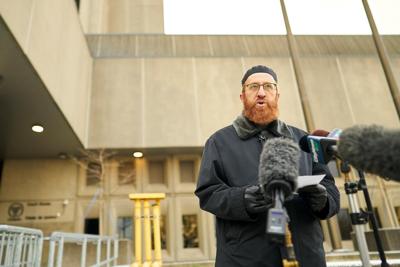LONDON, Ont. - The boy who survived a truck attack in London, Ont., that killed four members of his family addressed a sentencing hearing on Friday for the white nationalist convicted of the murders, a statement that brought many in court to tears.
The boy, whose name has been withheld to protect his privacy, was nine on June 6, 2021 – the day Nathaniel Veltman drove a truck into his family while they were out for walk.
"I can't talk to my family anymore and make new memories with them. I won't be able to have fun with them anymore," said the boy's victim impact statement, read out on his behalf.
Veltman, 23, was found guilty in November of four counts of first-degree murder and one count of attempted murder for hitting the Afzaal family.
The boy's 46-year-old father, Salman Afzaal; his 44-year-old mother, Madiha Salman; 15-year-old sister, Yumna; and 74-year-old grandmother, Talat Afzaal, were killed. He was seriously hurt.
Veltman said he targeted them with his black pickup truck because he believed they were Muslim based on their clothing and Salman Afzaal's beard.
Many in the packed courtroom, including some court staff, were moved to tears as the statement listed the things the boy can no longer share with those he loved most.
He said he missed his mother's food, going to prayers at the mosque with his father and making art with his grandmother.
You might be interested in
He said he would love to fight with his sister "one last time."
"Me and Yumna had plans that when she finally got her driver's licence, she would drive me around. She said it would cost 25 cents per drive. Now I'll never be able to see that," the statement said.
Veltman's trial was heard in Windsor, Ont., but the sentencing proceedings, including victim impact statements, took place in London.
The boy's statement was the last among dozens of testimonials delivered over the two-day hearing.
The Afzaals moved to Canada from Pakistan in 2007.
Earlier on Friday, friends and relatives of the victims said the attack shattered their faith in Canada as a place of tolerance.
In a statement read in court by the Crown, Madiha Salman's cousin Omar Ahmed, who lives in Pakistan, said he grew up watching relatives move to western countries to pursue better opportunities.
"The American Canadian dream was the end goal," he told the court. "But this is how the dream ends."
Canada's special representative on combating Islamophobia, Amira Elghawaby, has been in London to observe the hearing.
In a statement, she said "Canada has had the highest number of targeted deadly attacks against Muslims of any other G7 country."
She described Veltman's killings as "the second mass attack against Muslims in Canada," after the 2017 Quebec City mosque shooting that killed six men.
"The shock, horror and dismay that Islamophobia can become deadly is a realization that many Canadian Muslims have had to grapple with for years," Elghawaby said.
A school friend of Yumna's, Maryam Alsabawi, told the court that she never imagined her teenage years would "be spent fighting hate and Islamophobia."
"We didn't just lose Yumna and her beautiful family, but we lost our sense of belonging, our sense of community, our sense of safety, our sense of self," Alsabawi said.
She told the court she and Yumna would often talk about their shared plans for the future.
"I miss her contagious laughter, her smile, her kindness, her sense of humour. I miss going on walks with her. And I especially miss receiving her 3 a.m. texts about the most random things," Alsabawi said.
Throughout more than 70 statements, Veltman sat in court looking straight ahead, avoiding eye contact with the speakers.
Veltman's trial was the first where Canada's terrorism laws were put before a jury in a first-degree murder trial.
Justice Renee Pomerance, who oversaw the trial, instructed the jury they could convict Veltman of first-degree murder if they unanimously agreed prosecutors had established he intended to kill the victims, and planned and deliberated his attack.
She also told the jurors they could reach that same verdict if they found the killings were terrorist activity.
The terror component isn't a separate charge, and juries don't explain how they reach their verdict, so it's unclear what role – if any – the terror allegations played in their decision.
Pomerance may make findings on that issue as part of the sentencing process later this month.
Prosecutors had argued the attack was an act of terrorism by a self-professed white nationalist while defence lawyers argued Veltman didn't have criminal intent to kill the victims and didn't deliberate and plan the attack.
During the trial, Veltman testified that he was influenced by the writings of a gunman who committed the 2019 mass killings of 51 Muslim worshippers at two mosques in New Zealand.
He also said he had been considering using his pickup truck, which he bought a month earlier, to carry out an attack and looked up information online about what happens when pedestrians get struck by cars at various speeds.
Jurors had also seen video of Veltman telling a detective that his attack had been motivated by white nationalist beliefs. Court also heard that he wrote a manifesto in the weeks before the attack, describing himself as a white nationalist and peddling unfounded conspiracy theories about Muslims.
This report by The Canadian Press was first published Jan. 5, 2024.













Anyone can read Conversations, but to contribute, you should be a registered Torstar account holder. If you do not yet have a Torstar account, you can create one now (it is free).
To join the conversation set a first and last name in your user profile.
Sign in or register for free to join the Conversation